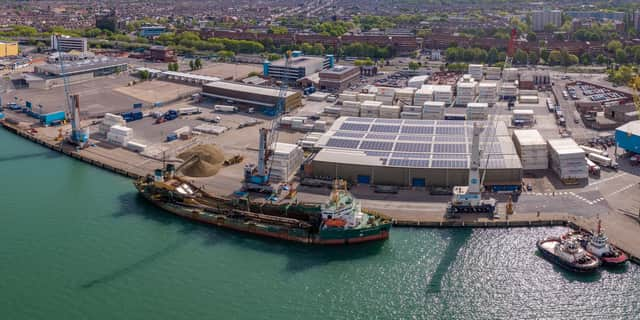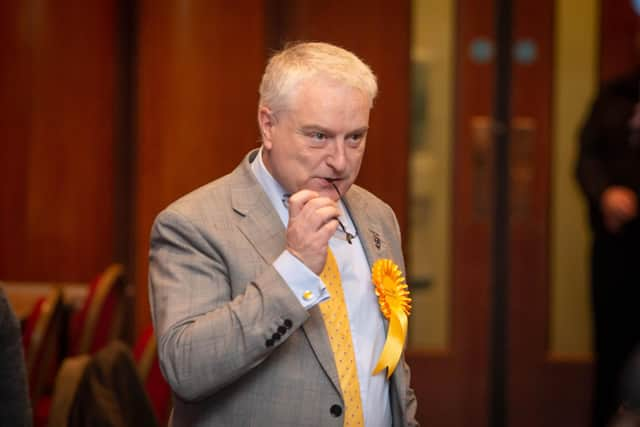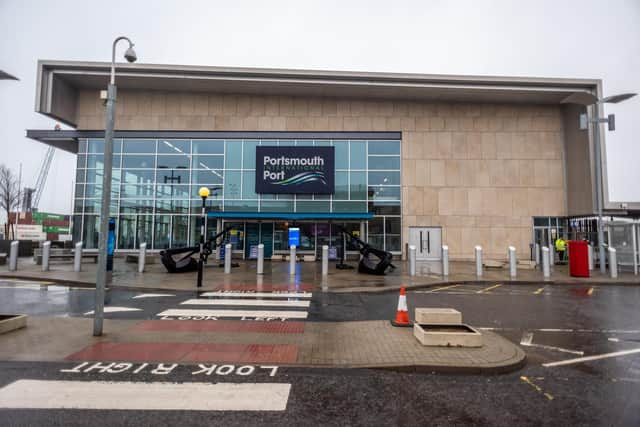Freeport in Solent 'golden opportunity' for Portsmouth economy but warnings over criminality of 'sleaze ports' have been raised


But amid the hullabaloo over Solent Freeport - one of eight new zones around the country set to benefit from import and export tax relief announced in Rishi Sunak’s Budget - excitement over the hub should be tempered, it has been said.
Mr Sunak said the plan would ‘turbodrive’ the economy, allowing businesses to grow, transport links to improve and encouraging new investment through tax breaks or lower tariffs.
Advertisement
Hide AdAdvertisement
Hide Ad‘(They are) special economic zones with different rules to make it easier and cheaper to do business,’ he told MPs in the House of Commons on Wednesday, as he proposed to use the ‘full measure of our fiscal firepower to protect the jobs and livelihoods of the British people’.


It means the Solent will join about 3,500 free zones around the world which employ 66 million people and feature in around 135 countries - with 80 freeports in the EU.
Former Portsmouth resident Tony Restall, an expat who has set up free zones around the world, said there was no guarantee a freeport would provide the benefits being lauded when they are due to come in towards the end of the year.
‘If you want to attract investment you must have free zone law - you need the legal documentation and this has not been cited yet,’ he said. ‘Rules and regulations are not produced overnight.


Advertisement
Hide AdAdvertisement
Hide Ad‘There are many free zones around the world and only a handful work. I don’t want us to be also-rans.
‘We can be number one but it is important we push in the right direction. They need to turn it into a mini Singapore style region and increase salaries.
‘Offering trading firms in freezones tax-free incentives for just five years is not enough.’
Tony said he also had concerns that ‘Pompey was getting the elbow’ into second place with references of a ‘Southampton’ freeport by Southampton born Mr Sunak and Associated British Ports.
Advertisement
Hide AdAdvertisement
Hide AdHe added: ‘Overall, it is 100 per cent a golden opportunity so let’s not screw it up and do things the right way to increase wealth, get us out of debt and provide a great future.’
Paul Monaghan, of Fair Tax Mark, a community benefit society, said his organisation had ‘misgivings’ over freeports – dubbed ‘sleaze ports’. He said: ‘Based on the analysis of other free zones around the world they very rarely create the jobs they set out to create,’ he said.
‘They just shift jobs from one place to another so there is very little net gain. Most progressive governments turn away from them.
‘They are a magnet for money laundering and other criminality because of the lack of regulation - to the extent these places are now being featured on movies and television series which look at how to avoid tax.
Advertisement
Hide AdAdvertisement
Hide Ad‘I can see why those who run freeports are upbeat as they get tax breaks unlike those outside. Those with property inside the zones will see prices rocket while those outside will not do so well.
‘There are winners and losers but freeports are not the way forward. Creating such opportunities should be done across the country rather than just in bespoke areas.’
Steve Goodrich, senior research manager at leading anti-corruption organisation Transparency International UK, said: ‘Without proper protections in place, the secrecy and security offered by freeports pose a major money laundering risk.
‘Failing to properly monitor and inspect the flow of goods passing through these zones effectively turns them into onshore secrecy havens and magnets for dirty money and illicit assets.
Advertisement
Hide AdAdvertisement
Hide Ad‘We look forward to seeing full details of exactly how these freeports would work, who would run them, and what sort of checks would be carried out on both the goods moving through these zones and the people making use of them.
‘Robust checks and full transparency over goods going in and out will ensure freeports do not become safety deposit boxes for criminals and the corrupt to stash their illicit wealth.’
Another organisation with concerns was Tax Justice UK, which referred to them as no ‘more than glorified business parks with a smattering of low skilled, poorly paid jobs’.
Meanwhile, research organisation Centre for Cities said previous free zones - introduced by the government as recently as 2012 and which included Southampton - were underwhelming.
Advertisement
Hide AdAdvertisement
Hide AdThe total new jobs were only around one-quarter of the estimates produced by the Treasury and were ‘overwhelmingly low skilled’, the centre’s research found.
Freeports - typically located around shipping ports or airports - are also known as free trade zones, and are designated areas where a country’s usual tax and tariff rules do not apply.
Goods in freeports can be imported, manufactured and exported without being subject to checks, paperwork or tariffs.
They aim to transform historic sea, air and rail ports into national hubs for trade, innovation and commerce to regenerate communities.
Advertisement
Hide AdAdvertisement
Hide AdFree zones are designed to attract major domestic and international investment and have streamlined planning processes to boost redevelopment.
Goods that arrive into freeports from abroad aren't subject to tax charges usually paid to the government.
These taxes are only paid if the goods leave the freeport and are moved elsewhere in the UK. Otherwise, they are sent overseas without the charges being paid.
Tax reliefs will include on purchasing land, constructing or renovating buildings, investing in new plant and machinery assets and on Employer National Insurance Contributions.
Advertisement
Hide AdAdvertisement
Hide AdThe idea for freeports was originally floated as a post-Brexit opportunity to stimulate global trade and create opportunities in the UK, as part of the government's plans for ‘levelling-up’.
Companies inside the new sites will be offered temporary tax breaks, which will mostly last for five years.
Freeports will come as a boost to firms operating within them. Chris Roberts, finance director of Caribbean shipping firm Geest Line, which operates from the port, said they were ‘delighted’.
‘It gives us more options and will remove some of the paperwork and (tax) duties,’ he said. ‘It is good news that we welcome and will hopefully encourage more trade through Portsmouth and the Solent and encourage more services.
‘We also hope it will lead to more for us to export.’
Advertisement
Hide AdAdvertisement
Hide AdGerald Vernon-Jackson, leader of Portsmouth City Council, said: ‘Businesses will be encouraged to base themselves in freeport locations, which will be a boost for our local community, with the opportunity to create thousands of new jobs and develop careers.
‘Across the whole Solent Freeport area it is expected to generate 52,000 jobs.
‘Portsmouth provides the necessary facilities, with the port already established and Dunsbury business park in Havant as a shovel ready site, which means a freeport will thrive straight away.
‘We expect the government to have freeport sites ready by late 2021.’
Advertisement
Hide AdAdvertisement
Hide AdMike Sellers, port director at Portsmouth International Port, said: ‘Our combined efforts across the region have shown the power of the Solent as a freeport.
‘We are pleased that our aim to create a freeport that focuses on green ambitions has been recognised. Now we have been selected, we can work with our partners on developing our plans further.
‘We’re ready to help UK trade recover and grow. The hard work begins now.’
Gosport MP Caroline Dinenage said: ‘I supported our freeport bid and I’m delighted it has been accepted by the government.
Advertisement
Hide AdAdvertisement
Hide Ad‘This proposal has the potential to attract £2bn investment and create 52,000 jobs nationally - just part of the Budget’s measures to help our area build back better after Covid-19.’
Steve Szalay, operations director at Southampton Airport, said: ‘It will play a key role in the economic recovery of our region by helping to create up to 25,000 jobs.
‘We are optimistic about the pivotal role that we can play in repositioning and rebuilding the region, that is why we are calling on our councillors to approve the runway extension to ensure we are able to continue to connect the central south, nationally and internationally.’
HOW FREEPORTS WORK
Freeports are typically located around shipping ports or airports.
Advertisement
Hide AdAdvertisement
Hide AdAlso known as free trade zones, they are designated areas where a country’s usual tax and tariff rules do not apply.
Goods in freeports can be imported, manufactured and exported without being subject to checks, paperwork or tariffs.
For example, raw materials could be imported from abroad and made into whole products for exporting overseas without any charges being paid.
Taxes would only be paid if the goods left the freeport and were moved elsewhere in the UK.
Advertisement
Hide AdAdvertisement
Hide AdThere were seven freeports operating in the UK between 1984 and 2012, including in Liverpool, Southampton the Port of Tilbury, the Port of Sheerness and Prestwick Airport. The legislation establishing them was not renewed.
Around 135 countries around the world have free trade zones, and a 2013 US Congressional report estimated there were roughly 3,500 globally. There are around 80 freeports in the EU.
The idea for freeports was originally floated as a post-Brexit opportunity to stimulate global trade and create opportunities in the UK, as part of the government's plans for ‘levelling-up’.
Ministers hope that the new freeports will help to regenerate more deprived areas in the country.
Advertisement
Hide AdAdvertisement
Hide AdMr Sunak said the freeports would have ‘simpler planning’, ‘cheaper customs – with favourable tariffs, VAT or duties’, and lower taxes, with ‘tax breaks to encourage construction, private investment and job creation’.
Companies inside the new sites will be offered temporary tax breaks, which will mostly last for five years.
That includes reductions to the tax companies pay on existing property, and when they purchase new buildings.
Employers will also pay reduced national insurance for new workers.
Advertisement
Hide AdAdvertisement
Hide AdWhile some say freeports can help to increase manufacturing, jobs and investment in poorer areas, critics claim they do not boost employment overall and moving economic activity from one area to another costs the taxpayer.
Labour has previously argued that freeports could attract money launderers and tax dodgers.
The governments in Scotland, Wales and Northern Ireland are expected to announce their own freeport policies.
More than 30 areas in England reportedly bid to become a freeport. The bids were scored against varying factors, including showing how a freeport could bring economic benefits to poorer regions.
Advertisement
Hide AdAdvertisement
Hide AdPrime minister Boris Johnson has previously outlined his plans for ‘levelling up’ deprived places in the UK.
Other criteria, like the impact of the coronavirus crisis on local areas and making sure freeports were ‘spread fairly’ across the country, were also looked at.
The locations of the eight new freeports are:
East Midlands Airport
Felixstowe and Harwich
Humber region
Liverpool City Region
Plymouth
Solent
Thames
Teesside.
A message from the Editor, Mark Waldron
You can subscribe here for unlimited access to Portsmouth news online - as well as fewer adverts, access to our digital edition and mobile app.
Our trial offer starts at just £2 a month for the first two months.
Comment Guidelines
National World encourages reader discussion on our stories. User feedback, insights and back-and-forth exchanges add a rich layer of context to reporting. Please review our Community Guidelines before commenting.